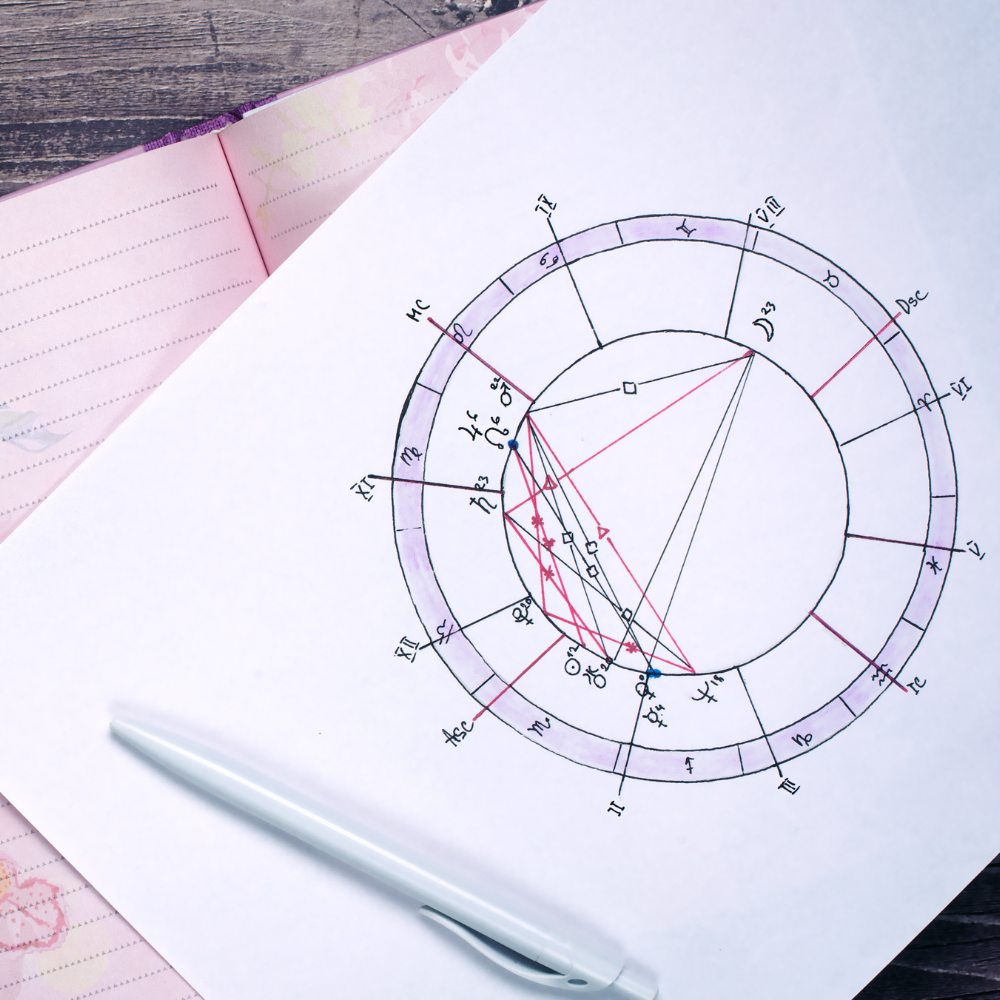Your Sun Sign is 1% of the Story
•Posted on December 29 2024

Why Judging Astrology by Your Sun Sign Doesn’t Tell the Whole Story
When someone says, “Astrology isn’t real because not all Libras are the same,” my immediate thought is, Oh, love, you’ve barely scratched the surface. Astrology is a beautifully complex system that reflects the depth and nuance of the human experience. To judge astrology based solely on Sun sign horoscopes is like judging a movie based on its trailer—you’re missing the whole story.
Astrology is far more than just your Sun sign. It’s about your unique natal chart, the map of the heavens at the exact moment you were born. So, let’s dive into why astrology deserves more than a surface-level glance and why skeptics might just find magic if they’re willing to dig deeper.
Astrology: More Than Your Sun Sign
Your Sun sign is an important piece of the puzzle—it represents your core identity and ego. But it’s just one piece. Your Moon sign speaks to your emotions and inner world, your Rising sign (Ascendant) colors how you approach life, and your Mercury, Venus, Mars, and other planetary placements reveal how you think, love, and act.
Imagine astrology as a symphony: the Sun is a soloist, but the Moon, Rising, and other planets are the orchestra creating the full melody of your life. To truly understand yourself, you need the entire score—your natal chart. It’s this intricate blend of signs, houses, and planetary aspects that makes you uniquely you.
For example, two Libras may share a Sun sign but have wildly different charts. One might have a fiery Aries Moon and bold Leo Rising, while another has a sensitive Pisces Moon and practical Capricorn Rising. These differences shape how each person expresses their Libra energy, making astrology deeply personal.
Astrology Throughout History
Astrology isn’t a fleeting trend; it’s a practice steeped in history and global significance. For thousands of years, civilizations around the world have turned to the stars for guidance.
- Ancient Egypt: The Egyptians connected astrology to their gods, aligning temples with the stars.
- Greece and Rome: Thinkers like Ptolemy developed astrology as a formal system, blending it with astronomy.
- China: Chinese astrology, with its zodiac animals and elements, offers a unique approach to understanding destiny.
- India: Vedic astrology, or Jyotish, remains a revered practice, emphasizing karma and spiritual growth.
- The Renaissance: Astrology was deeply respected by scientists like Johannes Kepler, who studied planetary motion to refine its accuracy.
Astrology has survived centuries of scrutiny, evolving alongside human understanding of the cosmos. Its endurance speaks to its value as a tool for self-awareness and connection.
The Art and Study of Astrology
Becoming an astrologer is no casual endeavor. It’s a lifelong study, blending science, intuition, and observation. You dive into planetary cycles, transits, and aspects, learning how they weave together to tell a story. Each chart is a new puzzle to solve, a map to explore.
I’ve been studying astrology since 2007, and I’ve read hundreds (if not thousands) of charts. What keeps me in awe is how accurate it can be—down to the day. But accuracy requires understanding the layers: the house systems, planetary rulerships, and how transits interact with someone’s unique chart. This depth is why working with a professional astrologer can be so enlightening.
My Journey with Astrology
I first turned to astrology during a tumultuous time in my life. Fresh out of college, I felt lost. My friends were moving away, I was struggling to find a job, and I’d just experienced my first big breakup. I craved direction and clarity. When I discovered my natal chart, it blew my mind. It showed me that I was exactly where I needed to be—even in the chaos.
I began to understand how free will and astrology intersect. Astrology is like a weather forecast: it tells you if it’s going to rain, but you decide if you’ll bring an umbrella or wear your best shoes and risk them getting ruined. It’s not about predicting inevitable outcomes; it’s about empowering choice and preparation.
Nearly 20 years later, I still turn to my chart, especially during challenging times. It’s my guide, helping me understand the energy at play and how I can navigate it. Sharing this insight with others and seeing how it resonates with their lives is one of the greatest joys of my work.
What Astrology Can Offer Skeptics
To the skeptics: I get it. Astrology can seem vague or overly general if you’ve only encountered Sun sign horoscopes. But here’s the thing: the deeper you go, the more nuanced it becomes.
-
Self-Discovery: Your natal chart reveals your strengths, challenges, and potential. It’s a tool for understanding your inner world.
-
Validation: Astrology often confirms what you already feel but couldn’t articulate. It puts words to the unspoken.
-
Guidance: Transits and progressions show the energy influencing your life, helping you make informed decisions.
If you’re curious but hesitant, start with a professional astrologer. They can guide you through your chart, explaining how it reflects your unique journey. Trust me, it’s worth it.
Why Astrology Endures
Astrology has stood the test of time because it speaks to something universal: our desire to understand ourselves and our place in the cosmos. It’s not about categorizing people into 12 signs; it’s about celebrating the complexity of every individual. Whether you’re a skeptic or a believer, astrology offers a lens through which to explore the magic of being human.
Final Thoughts
Astrology isn’t just a set of predictions or stereotypes—it’s a tool for self-awareness, empowerment, and growth. So, don’t dismiss it because you’re “not like other Libras.” Dive deeper. Explore your chart. Work with an astrologer who can show you how the planets uniquely dance in your life.
The stars don’t define you; they illuminate your path. How you walk it is up to you.
Comments
0 Comments
Leave a Comment